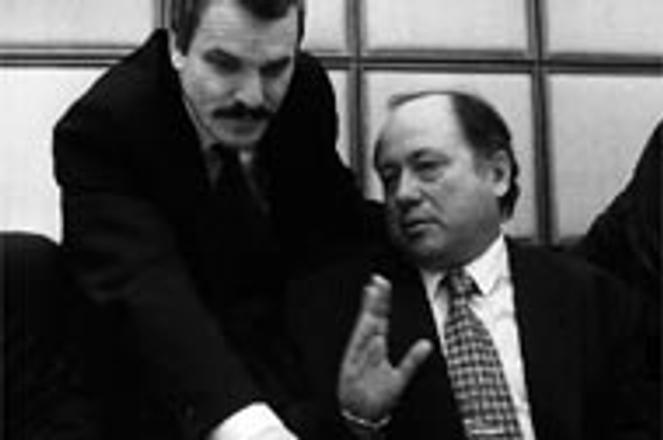Political targets. The two most wanted men by the opposition, Interior Minister Gustav Krajči (left) with Culture Minister Ivan HudecVladimír Hák
The opposition failed to arrange in parliament a no confidence vote in the Interior Minister Gustáv Krajči on June 12, as all 82 deputies from Prime Minister Vladimír Mečiar's ruling coalition boycotted the single-purposed extraordinary session called to try to oust Krajči.
The opposition expected to have difficulty collecting the 76 votes needed to unseat Krajči, but they believed at least a symbolic vote was necessary. What they did not expect was that the vote would never happen. Despite the coalition MPs having signed in as being present at parliament, only 58 of the total 150 deputies showed up in the chamber, 18 less than the necessary quorum.
"We were in the parliament building, busy with our duties. We were attending committee meetings," said Tibor Cabaj, head of the deputy club for Mečiar's Movement for a Democratic Slovakia (HZDS). "We support our minister and we see no reason for the no confidence vote," he added.
The opposition insisted on a vote because they hold Krajči responsible for thwarting a late May referendum on NATO accession and direct presidential election by giving an order to distribute ballots different from those approved by the president and the Central Referendum Commission (ÚKR).
Krajči stood steadfast in his opinion that he didn't do anything he wasn't entitled to. When asked by the daily Sme whether he was thinking of resigning willingly, Krajči said, "I have already stated that if the referendum and the mess around it is cited as the reason for my resignation, then I'm willing to resign only if the person responsible for this mess resigns too," he said, referring to President Michal Kováč.
By law, it is the president who declares the referendum, and the ÚKR who decides on the ballots. Kováč had tied the referenda on both subjects, and the ÚKR had decided the ballots would contain four questions, three concerning NATO accession and one concerning the direct election of the president.
According to the constitution, no one has the right to change approved ballots. Yet, the government said the fourth question was not relevant, and Krajči, as the minister in charge, ordered a print-out and distribution of ballots containing only three NATO questions.
Krajči cited a Constitutional Court ruling just before the referendum which said that a draft of a law on direct elections printed on the rear of the ballot was not legally binding, therefore printing such ballots was unlawful. In effect, the Court said the question could be put to a referendum.
The ensuing chaos revolving around the removal of the question caused confusion and anger nationwide. The ÚKR stated the distributed ballots were invalid and called the public vote thwarted. Most voters didn't vote and filed a complaint or ignored the vote completely. Only 9.8 percent of the electorate participated.


